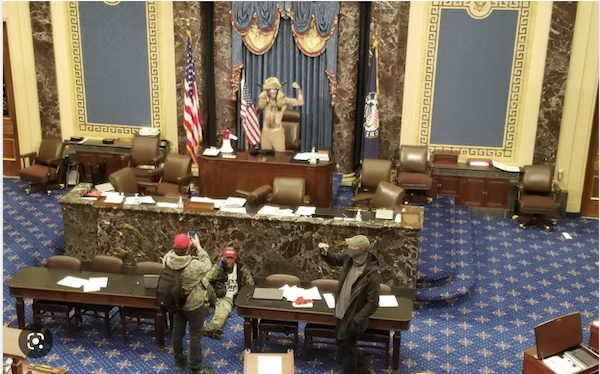Here is the world. Beautiful and terrible things will happen. Don't be afraid.
Meet the British intelligence-linked firm that warped MH17 news coverage The Greyzone
Tucker Carlson releases exclusive Jan. 6 footage, says politicians, media lied about Sicknick, ‘QAnon Shaman’ FOX. Here’s the QAnon shaman, standing at the Senate rostrum, surrounded by camo-clad cosplayers drinking in the spectacle and taking selfies:
It’s hard to believe that anybody organizing a coup would organize this. Leading to the question of whether a “coup” was being organized at all, surely?
Chris Hedges: Lynching the Deplorables Chris Hedges, Scheer Post. Well worth a read.
Inside the Suspicion Machine Wired. Wired got hold of a social credit algo from Rotterdam. A sample: “The comment field in the Rotterdam system, for example, where caseworkers are asked to make general observations, is binary. Any comment is converted to a “1,” while a blank field is converted to a “0.” This means negative and positive comments affect the score in the same way.” And much else like that.
The Algorithm Society and Its Discontents Brad DeLong, Project Syndicate
Reid, Blake Ellis, Uncommon Carriage (February 21, 2023). Stanford Law Review, Vol. 76, 2024 (forthcoming), U of Colorado Law Legal Studies Research Paper No. 22-20, Available at SSRN: https://ssrn.com/abstract=4181948 or http://dx.doi.org/10.2139/ssrn.4181948
“As states have started to regulate the carriage of speech by “Big Tech” Internet platforms, scholars, advocates, and policymakers have increasingly focused their attention on the law of common carriage. Legislators have invoked common carriage to defend social media regulations against First Amendment challenges, making arguments set to take center stage in the Supreme Court’s impending consideration of the NetChoice saga. This Article challenges the coherence of “common carriage” as a field and its utility for assessing the constitutionality and policy wisdom of Internet regulation.
Assessing the post-Civil War history of common carriage regimes in telecommunications law, this Article illustrates that conceptions of common carriage and its treatment by the courts vary significantly and are highly contingent on specific historical and technological circumstances.
The Article observes that common carriage is an attractive nuisance for policymakers and judges that distracts from difficult normative questions over the extent of permissible government interventions into speech and editorial discretion that lie at the heart of contemporary debates over Internet policy. The Article disentangles talismanic invocations of “common carriage” by isolating three distinct questions: (1) the classification of “common carriers,” (2) the imposition of “common carriage” rules on those carriers, and (3) the First Amendment problems that flow from the imposition.
Applying this novel three-part framework, this Article argues for a context- sensitive approach to Internet regulations that evaluates the designation of carriers, the imposition of rules, and the role of the First Amendment on a granular basis that more seriously accounts for the complexity of contemporary Internet platforms.”
